The next step I took in researching the Dickinson Class of 1852 was looking at 19th century newspapers, through online databases. This process was both fruitful and time consuming. My basic strategy for finding useful information in these databases was searching for people, in the class of 1852, who have confirmed death dates. This date helped me narrow my search to around the time of their death to look for an obituary. After looking through the Alumni Record: Dickinson College, I found that of the 55 graduating and non-graduating members of the class, only ten have an exact recorded death date on file. Using this information as a starting point, I then used the Dickinson Library Database Finder, to gain access to multiple websites with literally millions of century old newspapers on file. I started using the 19th Century U.S. Newspapers database. Through previous research I have found that one of the most renowned members of this class is Charles Albright, so I started my search process with him. I confined my search to within a month of his death, figuring that if someone did write an obituary for him, it would be shortly after he died. This proved to be true as the second link that appeared was a copy of his obituary, published the day after his death. The 19th Century U.S. Newspapers however, for multiple reasons, was not as helpful on the other members of my class. Some students died in the early 20th century so the papers being published at the time of their death are not part of this database. After preforming the same search on the other nine members of this class and not finding anything I switched databases. After searching through other databases with no prevail, Accessible Archives and Civil War Era, I finally tried the Chronicling America database that is hosted by the Library of Congress. At this time, I decided to widen my search to articles in the life time of the person that I’m searching. The Chronicling America database proved to be extremely useful. Articles surfaced referring to some of the marriages that Reverend Thomas Sherlock officiated as well as another article talking about Sherlock’s unexpected death.
Published in The North American, Charles Albright’s obituary paints the picture of a well-rounded intellectual who lived a fulfilling life of service to his country as well as his community. After Dickinson Albright studied law up until the Civil War. When Broke out her volunteered with the One Hundred and Thirty Second regiment, Pennsylvania Volunteers. Albright commanded a brigade in the Union Army at the Battle of Chancellorsville. He also served in the United States Congress after the War. (Albright is pictured right).
The North American was a daily newspaper that printed in Philadelphia, Pennsylvania from the years 1839- 1925. According to Chronicling America, the paper was prominent Whig newspaper. The Whig party was formed due to a dislike of President Andrew Jackson and the Democrats. Their main grievances against the Democrats were, according to the Columbia Encyclopedia, “a severe dislike towards tyranny.” Prominent national figures joined this party such as Henry Clay from Virginia and Daniel Webster from New Hampshire. The election of 1852 however, “brought about a quick end to the party and its remnants gravitated toward other parties” (Columbia Encyclopedia). The main party that Whigs resorted to after the collapse was the Republican party, the antislavery party. It can be inferred that that there would be some bias in this paper as it has clear Republican affiliations. Even the name shows quite clearly what side it is on, The North America.
There is an incorrect statement in article below. Although Albright went to Dickinson for four years, he did not graduate with the class according to the Dickinson College Alumni Record.
There are many articles published that include Dickinson graduate Thomas Sherlock. He was a Methodist reverend who apparently officiated multiple weddings. These articles do not talk into detail about Sherlock but they make it possible to recognize his work. Shown directly below are two of the articles that list Sherlock as the reverend at the wedding on from 1857 and one from 1859. Both of these articles were published in The Star of The North. Although it is not clear in these articles this paper affiliates with the Republican Party.
Courtesy of The Star of The North
This third article talks about the unexpected death of Reverend Thomas Sherlock. According to the article Sherlock went out for a morning walk on the beach, suffered a hemorrhage and died on the spot. Although, this article is literally one paragraph long, it still has a powerful message. Sherlock was a devoted priest but also had a strong sense of community. His death was completely unexpected. The Juniata Sentinel and Republican was a weekly newspaper that was printed in Mifflintown, Pennsylvania. The title makes the party affiliation clear.
Works Cited:
“Albright, Charles,” House Divided: The Civil War Research Engine at Dickinson College, http://hd.housedivided.dickinson.edu/node/4962.
“General Charles Albright of Carbon County”. The North American. Philadelphia, Pennsylvania, Wednesday, September 29, 1880. [Nineteenth Century U.S. Newspapers].
George Leffingwell Reed, ed., Alumni Record: Dickinson College (Carlisle, PA: Dickinson College, 1905).
“The Whig Party.” The Columbia Encyclopedia. 6th ed. New York, New York: Columbia UP, 2012. Print.
“Married”. The Star of the North. Bloomsburg, Pennsylvania, Wednesday, January 13th, 1858. [Chronicling America].
“Married”. The Star of the North. Bloomsburg, Pennsylvania, Wednesday, November 16th, 1859. [Chronicling America].
“Short Locals.” Juniata Sentinel and Republican. Mifflintown, Pennsylvania, Wednesday, September 2nd, 1855. [Chronicling America].
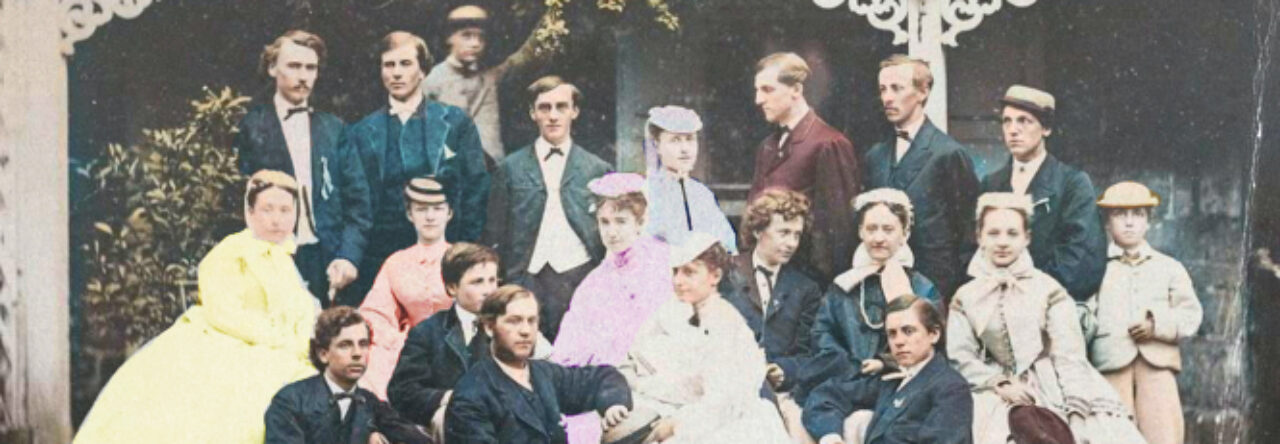
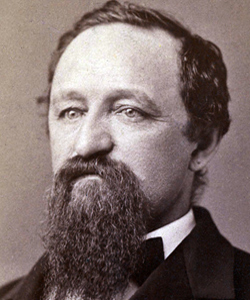
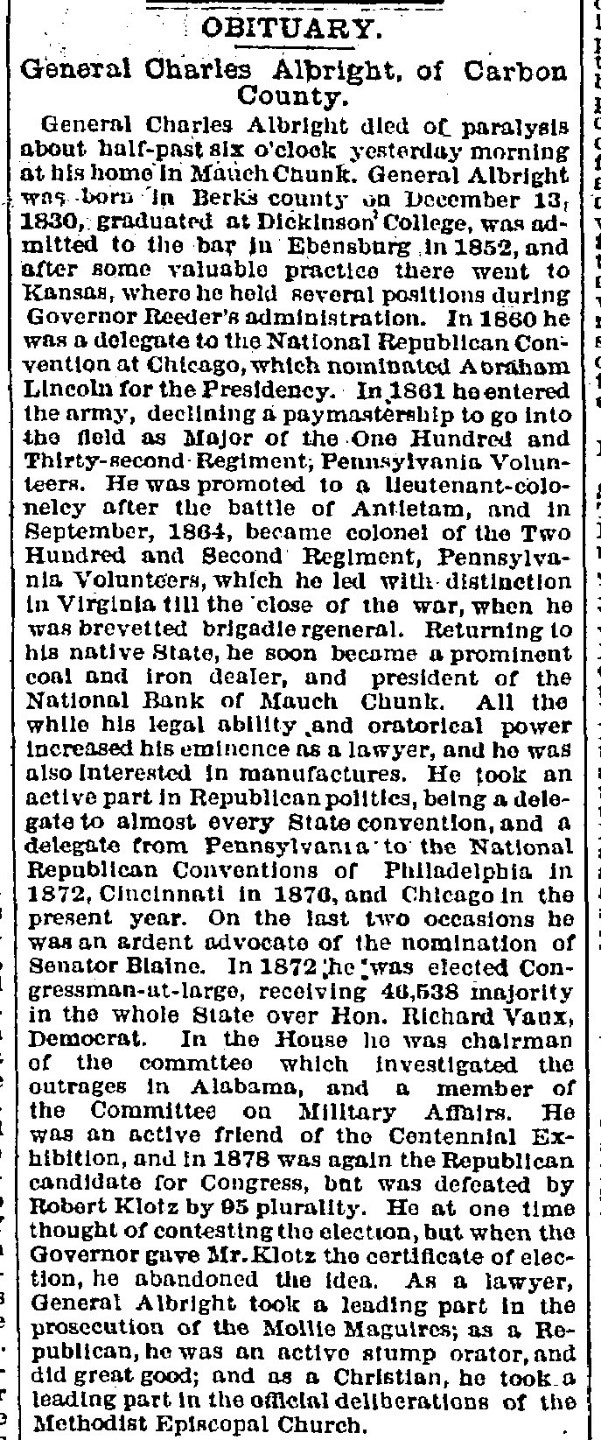
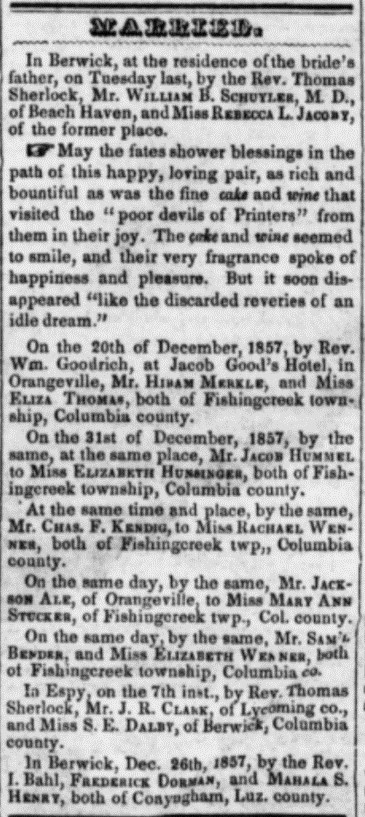
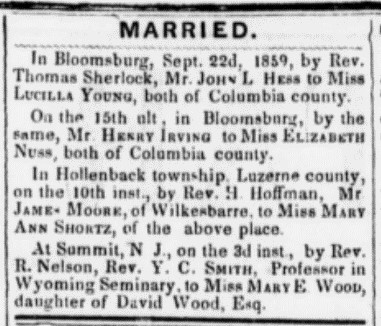
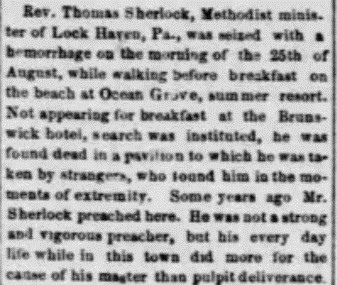
Leave a Reply